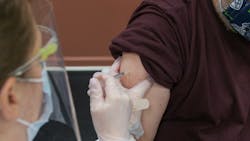COVID-19 vaccination may be less effective in immunocompromised, steady suggests
Immunocompromised persons benefit from COVID-19 mRNA vaccination but are less protected from severe COVID-19 outcomes than are immunocompetent persons, according to researchers evaluating VISON Network data.
The effectiveness of mRNA vaccination against laboratory-confirmed COVID-19–associated hospitalization was lower (77%) among immunocompromised adults than among immunocompetent adults (90%). Vaccine effectiveness varied considerably among immunocompromised patient subgroups, %), according to the Centers for Disease Control and Prevention (CDC) in is Morbidity and Mortality Weekly Report (MMWR).
Immunocompromised persons receiving mRNA COVID-19 vaccines should receive 3 doses and a booster, consistent with CDC recommendations, practice nonpharmaceutical interventions, and, if infected, be monitored closely and considered early for proven therapies that can prevent severe outcomes.
Immunocompromised people, defined as those with suppressed humoral or cellular immunity resulting from health conditions or medications, account for approximately 3% of the U.S. adult population, according to the CDC press release announcing these findings.
To evaluate vaccine effectiveness (VE) among immunocompromised adults, researchers analyzed data from the VISION Network on hospitalizations among people 18 years of age or older with COVID-19-like illness from 187 hospitals in nine states during January 17-September 5, 2021. Using selected discharge diagnoses, the researchers evaluated VE against COVID-19-associated hospitalization conferred by completing a 2-dose series of an mRNA COVID-19 vaccine at least 14 days before the index hospitalization.
The researchers compared 20,101 immunocompromised adults, including 10,564, or 53%, who were fully vaccinated and 69,116 immunocompetent adults, including 29,456, or 43%, who were fully vaccinated.
The lower effectiveness of the vaccines for immunocompromised people persisted irrespective of mRNA vaccine product, age group, and timing of hospitalization relative to SARS-CoV-2 B.1.617.2 (Delta variant) predominance in the state of hospitalization, the CDC said.
The researchers also found that vaccine effectiveness varied across immunocompromising condition subgroups, ranging from 59% (organ or stem cell transplant recipients) to 81% (persons with a rheumatologic or inflammatory disorder).
